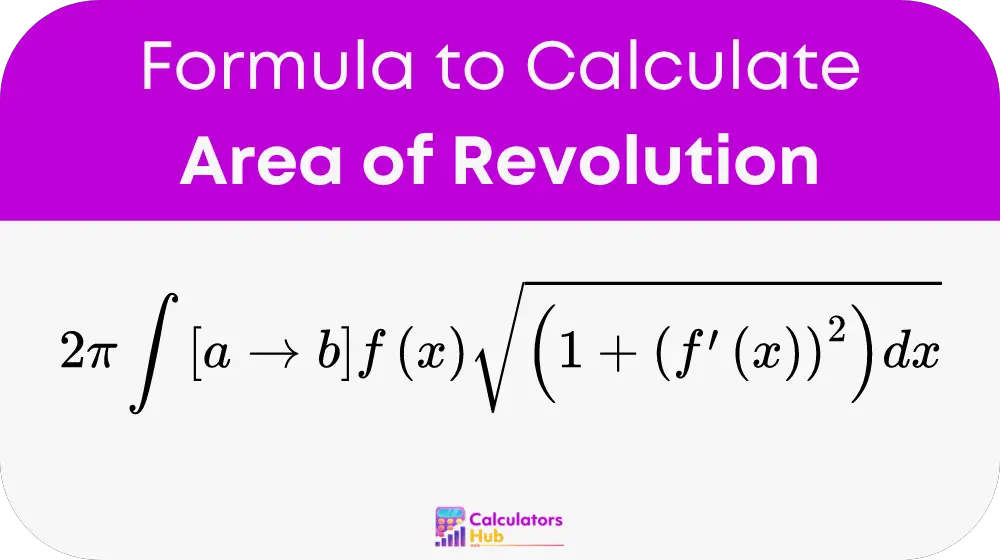The Area of Revolution Calculator is designed to compute the surface area of a shape that is created when a curve is revolved around an axis. This calculation is pivotal in many areas of study, including physics, engineering, and mathematics, where such shapes often represent real-world objects like vessels, tubes, and other rotational bodies.
Formula of Area of Revolution Calculator
The mathematical foundation of the Area of Revolution Calculator is rooted in integral calculus, specifically the formula for the surface area of a shape revolved around the x-axis:

Where:
- f(x): Represents the function being revolve around the x-axis.
- f'(x): Denotes the derivative of the function with respect to x.
- a, b: The limits of integration, defining the interval over which the function is revolve.
- π: Pi, a mathematical constant approximately equal to 3.14159.
- ∫[a to b]: Indicates the definite integral from a to b.
This formula is use to calculate the total surface area generate when the graph of f(x) is revolve around the x-axis between the limits a and b.
General Terms and Conversion Table
To aid in comprehension, here’s a table of terms related to the calculation of the area of revolution:
| Term | Definition |
|---|---|
| Surface Area of Revolution | The total area of a surface formed by revolving a curve around an axis. |
| Definite Integral | A calculus concept used to calculate the area under a curve between two points. |
| Function (f(x)) | A mathematical expression defining a relationship between a dependent variable and one or more independent variables. |
| Derivative (f'(x)) | A measure of how a function changes as its input changes. |
| Limits of Integration (a, b) | The endpoints of the interval over which integration is performed. |
Example of Area of Revolution Calculator
Consider the function f(x) = x^2 being revolve around the x-axis from x = 0 to x = 1. Using the Area of Revolution Calculator:
- f(x) = x^2
- f'(x) = 2x
- The calculation becomes:
Area = 2π ∫[0 to 1] x^2 √(1 + (2x)²) dx
Calculating this integral, either through analytical methods or using the calculator, provides the surface area of the resulting shape.
Most Common FAQs
Understanding the area of revolution helps in designing and manufacturing various mechanical parts and systems, particularly those involving rotational symmetry.
Yes, as long as the function and its derivative are well-defined over the interval [a, b], the calculator can compute the area for both simple and complex functions.
Errors in inputting the function, its derivative, or the limits of integration can lead to incorrect results. Ensuring accurate entries is crucial for reliable calculations.